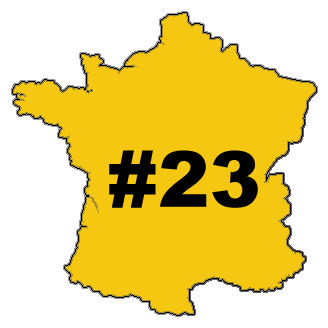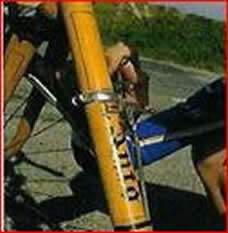| |

By Barry Boyce, CyclingRevealed Historian

The Yellow Bicycle

|
|
Top 25 All Time Tours:
#23: 1930- Innovation: National Teams
“New ideas! Bold Initiatives!” were necessary to pull the Tour de France (TdF) out of the relentless rut of tedium. Race director Henri Desgranges steadfastly maintained the Tour's founding ideal of “individual heroism.” The very powerful trade teams, whose members rode for “team“ not ”individual”, dominated the Tours of the late twenties. Desgranges took a bold step in 1930 by eliminating the trade team system and instituting the National team structure. It was perhaps the most important change he made during his tenure as race director.
The changes did not come without a monetary cost. Part of the change meant each rider would be outfitted with an identical “yellow colored” bicycle. This became a costly undertaking and the elimination of the trade teams meant the elimination of the commercial sponsorship money. Each team's expenses had to be paid by the race's long time organizer, L'Auto newspaper. The race director needed to find a way to pay for the increased cost. Desgranges, taking the advice of Pierre Thevenin (advertising manager of Menier Chocolates), came up with a masterstroke of advertising. He introduced the Tour's first “Caravane de Publicite” (publicity caravan). The publicity caravan tapped both the cycling industry, which had money to spend on advertising, and the non-cycling companies, who loved the opportunity to advertise with the popular Tour de France.
The national team format may have been very necessary, but it was revolutionary, untested concept. It took the exploits of a band of young French riders to make the Tour in 1930 a resounding success. Charles Pelissier, youngest of the famous Pelissier brother, won eight stages, including 4 in a row (a record that has only been tied). The very popular Andre Leducq won two stages and took full control of the race lead in the Pyrenees Mountains. Antonin Magne rode to a third place finish and a spot on the podium in Paris. Pierre Magne finished sixth, Benoit Faure finished seventh, and Pelissier finished ninth overall.
Although the French team easily won the race, it did not come without drama along the way. The powerful Italian team featured “Campionissimo” Alfredo Binda and Learco “the human locomotive ” Guerra. In the early stages of the race the Italians controlled every battle. However, their efforts began to crumble on the 222 km stage 7, “individual team departure” (Team Time Trial) race, from Bordeaux to Hendaye. Team leader Alfredo Binda crashed heavily and lost more than an hour. Showing his pride and talent Binda roared back to win stages 9 and 10, but the pain of his injuries became too much and he sadly abandoned on stage 10.
Control of the race went to the French team on stage 9 from Pau to Luchon. During the first day of Pyrenees climbing, Andre Leducq made the small breakaway group with Binda that gained 13 minutes and 10 seconds on race leader Guerra. Leducq grabbed the Maillot Jaune (race leader's Yellow Jersey) but the Tour was only half way to Paris.
Leducq and his teammates slowly increased the overall lead, which lasted until the climb of the Col du Galibier on stage 16. Previous race leader Guerra, needing to gain over 16 minutes, attacked on the climb and opened a solid gap. Chasing with wild abandon, Leducq crashed heavily on the descent of the Galibier. He injured his knee and quickly lost 15 minutes to the Italian. Without hesitation the rest of the French team waited for their leader and began a furious chase. Before the finish in Evian the French team got Leducq back to the lead pack and set up a grand finish for the stage. On the streets of Evian, Leducq capped the day by out sprinting a lead group of 30 riders for the stage win. He had snatched victory from the jaws of disaster.
The French team controlled the remaining 5 stages with Charles Pelissier taking the final 4 stage wins. Andre Leducq rolled into Parc des Princes Velodrome in Paris victoriously. With Leducq's victory, the French fans had excitement restored to their Tour.
Clearly the search for “New ideas! Bold Initiatives!” was commencing. More changes to the TdF would happen in the coming years, but slowly because of Desgranges. The national team format was clearly a success and led to additional initiatives. The French were again rushing out to buy their daily L'Auto. Henri Desgranges had to be very pleased with the result achieved in 1930, but it remains unclear how he truly felt about the French teamwork needed to save the victory. Individual heroism was abandoned and each French team member rode for team, not individual. Regardless of how anyone felt, bottom line of the results, the Tour de France was back on track.
TdF 1930 Recap
| Stage and Distance |
Stage Winner |
Yellow Jersey Race Leader |
| Stage 1 PARIS - CAEN, 206 km |
Charles Pelissier (Fra) |
|
| Stage 2 CAEN - DINAN, 203 km |
Learco Guerra (Ita) |
|
| Stage 3 DINAN - BREST, 206 km |
Charles Pelissier (Fra) |
Guerra Learco (Ita) |
| Stage 4 BREST - VANNES, 210 km |
Omer Taverne (Bel) |
Guerra Learco (Ita) |
| Stage 5 VANNES - LES SABLES D'OLONNE, 202 km |
Andre Leducq (Fra) |
|
| Stage 6 LES SABLES D'OLONNE - BORDEAUX, 285 km |
Jean Aerts (Bel) |
Guerra Learco (Ita) |
| Stage 7 BORDEAUX - HENDAYE, 222 km |
Jules Merviel (Fra) |
|
| Stage 8 HENDAYE - PAU, 146 km |
Alfredo Binda (Ita) |
Guerra Learco (Ita) |
| Stage 9 PAU - LUCHON, 231 km |
Alfredo Binda (Ita) |
Andre Leducq (Fra) |
| Stage 10 LUCHON - PERPIGNAN, 322 km |
Charles Pelissier (Fra) |
Andre Leducq (Fra) |
| Stage 11 PERPIGNAN - MONTPELLIER, 164 km |
Charles Pelissier (Fra) |
Andre Leducq (Fra) |
| Stage 12 MONTPELLIER - MARSEILLE, 209 km |
Antonin Magne (Fra) |
Andre Leducq (Fra) |
| Stage 13 MARSEILLE - CANNES, 181 km |
Learco Guerra (Ita) |
Andre Leducq (Fra) |
| Stage 14 CANNES - NICE, 132 km |
Louis Peglion (Fra) |
Andre Leducq (Fra) |
| Stage 15 NICE - GRENOBLE, 333 km |
Learco Guerra (Ita) |
Andre Leducq (Fra) |
| Stage 16 GRENOBLE - EVIAN, 331 km |
Andre Leducq (Fra) |
Andre Leducq (Fra) |
| Stage 17 EVIAN - BELFORT, 282 km |
Frans Bonduel (Bel) |
Andre Leducq (Fra) |
| Stage 18 BELFORT - METZ, 223 km |
Charles Pelissier (Fra) |
Andre Leducq (Fra) |
| Stage 19 METZ - CHARLEVILLE, 159 km |
Charles Pelissier (Fra) |
Andre Leducq (Fra) |
| Stage 20 CHARLEVILLE - MALO LES BAINS, 271 km |
Charles Pelissier (Fra) |
Andre Leducq (Fra) |
| Stage 21 MALO LES BAINS-PARIS/Parc des Princes, 300 km |
Charles Pelissier (Fra) |
 Andre Leducq (Fra) Andre Leducq (Fra) |
Starters: 100
Finishers: 59
Distance: 4,822 km
Average: 27.978 km/h
Teams:
1. FRANCE 517h34'09”
2. Belgium +1h48'58”
3. Germany +5h09'59” CR's TIME LINE 1930:
DATE |
RACE |
WINNER |
DISTANCE |
March 30, 1930 |
Milan-San Remo |
Julien Vervaecke (Bel) |
286.5 km |
April 13, 1930 |
Tour of Flanders |
Michele Mara (Ita) |
227 km |
April 20, 1930 |
Paris-Roubaix |
Frans Bonduel (Bel) |
258 km |
May 29, 1930 |
Liege-Bastogne-Liege |
Herman Buse (Ger) |
231 km |
May 17-June 8, 1930 |
Giro d'Italia |
Luigi Marchiso (Fra) |
15 Stages, 3,097 km |
July 2-27, 1930 |
Tour de France |
Andre Leducq (Fra) |
21 Stages, 4,822 km |
August 30, 1930 |
World Championships |
Alfredo Binda (Ita) |
Liege, Belgium, 210 km |
October 26 1930 |
Giro di Lombardia |
Michele Mara (Ita) |
Milan-Milan, 234 km |
• MIT - 1930, the computer age began at MIT when scientists started work on the first computer.
• World Cup - The first ever Football (Soccer) World Cup was held in Uruguay. Host nation Uruguay beat Argentina 4-2 to win the World Cup.
• Germany - Adolf Hitler gains significant political power in the aftermath of the collapse of the German economy and the Wall Street crash. Hitler's National Socialist Party gained 107 seats Reichstag.
• Pluto - Clyde W. Tombaugh discovered the ninth and smallest planet in our solar system.
• Notable Deaths - Sir Arthur Conan Doyle , 1859-1930, British author and creator of the Sherlock Holmes detective stories.
Sport Figure of the Decade - L'Equipe's athlete of the decade was Jesse Owens, USA. He was a multiple Gold Medallist at the 1936 Berlin Olympics. In the face of Hitler's superior Aryan athletes, Owens, a black man, won 4 gold medals. He became a folk hero in America when a furious Hitler snubbed him after his great performance. Owens would go down in history as one of the greatest track and field athletes of all times.
Return
to the Table
of Contents |
|
